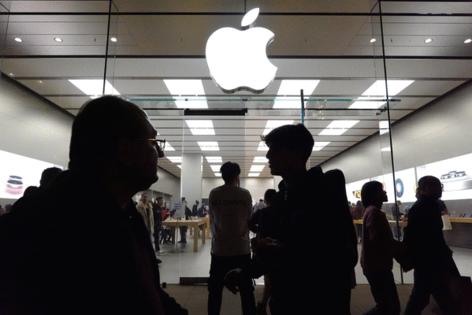US, California sue Apple, alleging company monopolized smartphone market
Published in Business News
The U.S. Justice Department and 16 state attorneys general, including California’s, filed a sweeping antitrust lawsuit against Apple on Thursday, alleging that the technology giant attempted to monopolize the smartphone market to boost its business.
The complaint, filed in the U.S. District Court in New Jersey, alleges that Cupertino, California-based Apple violated antitrust laws by preventing other companies from offering applications that compete with Apple’s products or that make rival smartphones more attractive to iPhone users. The lawsuit comes after a yearslong investigation into the company’s business practices.
The lawsuit seeks to restore competition in the tech market to protect customers from higher prices and expand their product choices. The government took issue with Apple restricting access to points of connection between third-party apps and the iPhone operating system, which makes those non-Apple apps and accessories less useful, said U.S. Attorney General Merrick Garland.
“Consumers should not have to pay higher prices because companies break the law,” Garland said during a news conference Thursday. “We allege that Apple has employed a strategy that relies on exclusionary, anticompetitive conduct that hurts both consumers and developers. For consumers, that has meant fewer choices; higher prices and fees; lower quality smartphones, apps, and accessories; and less innovation from Apple and its competitors.”
IPhones are the most popular smartphone in the United States, accounting for more than 60% of sales, analysts say. Its main competition comes from phones made by Samsung and other manufacturers that run Alphabet’s Android operating system.
Apple generated annual net revenues of $383 billion in 2023 and a net income of $97 billion. IPhone sales made up the largest chunk of the company’s revenue in its most recent quarter.
“This lawsuit threatens who we are and the principles that set Apple products apart in fiercely competitive markets,” an Apple spokesperson wrote in a statement. “If successful, it would hinder our ability to create the kind of technology people expect from Apple — where hardware, software, and services intersect. It would also set a dangerous precedent, empowering government to take a heavy hand in designing people’s technology.”
The government alleges that over the years, Apple has blocked banks and other finance companies from developing alternative payment products that would compete with Apple’s digital wallet on the iPhone. At the same time, the company has encouraged those banks to participate in Apple Wallet. Apple has also made it challenging for someone with an iPhone to use non-Apple smartwatches and other connected devices in an effort to boost its own products, Garland said.
Garland used text messages between iPhone and Android users as an example of the company’s alleged monopolistic practices. He argued that Apple purposely diminishes the functionality of its own messaging app and other apps to degrade quality when interacting with non-Apple devices — leading to conversations that can’t be encrypted, videos with lower picture quality, and the loss of editing functions and message-in-progress indicators — in an effort to make iPhones seem to be a superior product.
“As a result, iPhone users perceive rival smartphones as being lower quality because the experience of messaging friends and family who do not own iPhones is worse — even though Apple is the one responsible for breaking cross-platform messaging,” Garland said.
John Bergmayer, legal director at the nonprofit public interest group Public Knowledge, applauded the lawsuit, calling it a crucial step toward restoring competition and boosting innovation in the mobile ecosystem.
“Consumers are paying the price for Apple’s abuse of its gatekeeper power — not just in higher smartphone prices, but in reduced innovation and a more limited, locked-down user experience,” Bergmayer said in a statement. “As the complaint describes, privacy and security do not justify Apple’s actions. Protecting users does not justify, nor require, anticompetitive and illegal conduct.”
“In fact, as the complaint alleges, Apple’s actions can harm the security and privacy of smartphone users, by putting obstacles in the way of secure, cross-platform messaging,” he said.
Thursday’s lawsuit is the latest lodged by U.S. officials against large technology companies. The government has also filed antitrust complaints in recent years against Amazon, Google and Meta.
This isn’t the first time Apple has faced scrutiny.
The Justice Department last sued Apple in 2012, accusing the company of colluding with book publishers to fix e-book prices. Apple was required to pay a $450 million settlement in the case.
Epic Games, the maker of “Fortnite,” sued Apple in 2020 alleging that the company violated federal law because it banned third-party app marketplaces on its operating system, requiring all developers to use Apple’s App Store. The dispute began after Apple booted “Fortnite” from the App Store because Epic had created a workaround to paying the 30% fee Apple collected from developers on customers’ in-app purchases.
A U.S. District judge ruled in that case that Apple didn’t maintain a monopoly in the market for mobile games, but ordered the company to permit developers to alert customers to different payment options outside the App Store.
Apple was also hit this month with a $2 billion penalty by the European Union following an investigation into allegations it prevented music streaming competitors, such as Spotify, from communicating with users about deals that could draw customers away from Apple’s App Store.
Although European regulators have focused largely on the company’s App Store, the U.S. government’s case is much more sweeping, taking aim at Apple’s entire menu of products and services.
Deputy Attorney General Lisa Monaco said that Apple has been working for years to tighten its hold on the smartphone market, shortchanging consumers.
“It has done so not through product improvements — but by maintaining a chokehold on competition — locking its customers in to the iPhone while locking its competitors out of the market,” Monaco said. “As a result ... Apple has gone from revolutionizing the smartphone market to stalling its advancement.”
©2024 Los Angeles Times. Visit at latimes.com. Distributed by Tribune Content Agency, LLC.







Comments